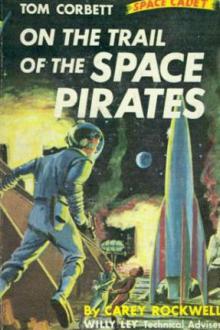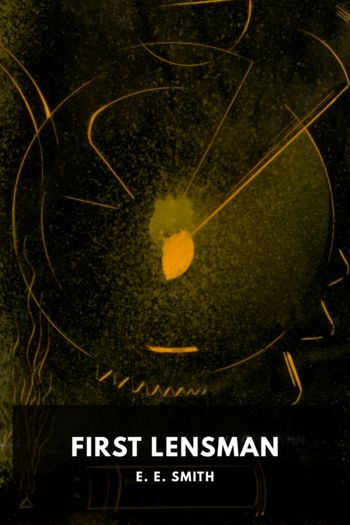Triplanetary - E. E. Smith (phonics reader TXT) 📗

- Author: E. E. Smith
Book online «Triplanetary - E. E. Smith (phonics reader TXT) 📗». Author E. E. Smith
“Accident! Fred Hinton! Is he … ?”
“I’m afraid so, sir.”
It is a harrowing thing to have to help gather up what fragments can be found of one of your best friends. Kinnison was white and sick as he got back to the firing station, just in time to hear the Chief Safety Officer say:
“Must have been carelessness—rank carelessness. I warned this man Hinton myself, on one occasion.”
“Carelessness, hell!” Kinnison blazed. “You had the guts to warn me once, too, and I’ve forgotten more about safety in explosives than you ever will know. Fred Hinton was not careless—if I hadn’t been called in, that would have been me.”
“What is it, then?”
“I don’t know—yet. I tell you now, though, Major Moulton, that I will know, and the minute I find out I’ll talk to you again.”
He went back to Siberia, where he found Tug and Paul, faces still tear-streaked, staring at something that looked like a small piece of wire.
“This is it, Uncle Ralph,” Tug said, brokenly. “Don’t see how it could be, but it is.”
“What is what?” Kinnison demanded.
“Firing pin. Brittle. When you pull the safety, the force of the spring must break it off at this constricted section here.”
“But damn it, Tug, it doesn’t make sense. It’s tension … but wait—there’d be some horizontal component, at that. But they’d have to be brittle as glass.”
“I know it. It doesn’t seem to make much sense. But we were there, you know—and I assembled every one of those God damned mines myself. Nothing else could possibly have made that mine go off just when it did.”
“OK, Tug. We’ll test ’em. Call Bart in—he can have the scale-lab boys rig us up a gadget by the time we can get some more of those pins in off the line.”
They tested a hundred, under the normal tension of the spring, and three of them broke. They tested another hundred. Five broke. They stared at each other.
“That’s it.” Kinnison declared. “But this will stink to high Heaven—have Inspection break out a new lot and we’ll test a thousand.”
Of that thousand pins, thirty two broke.
“Bart, will you dictate a one-page preliminary report to Vera and rush it over to Building One as fast as you can? I’ll go over and tell Moulton a few things.”
Major Moulton was, as usual, “in conference,” but Kinnison was in no mood to wait.
“Tell him,” he instructed the Major’s private secretary, who had barred his way, “that either he will talk to me right now or I will call District Safety over his head. I’ll give him sixty seconds to decide which.”
Moulton decided to see him. “I’m very busy, Doctor Kinnison, but. …”
“I don’t give a swivel-eyed tinker’s damn how busy you are. I told you that the minute I found out what was the matter with the M2 mine I’d talk to you again. Here I am. Brittle firing pins. Three and two-tenths percent defective. So I’m. …”
“Very irregular, Doctor. The matter will have to go through channels. …”
“Not this one. The formal report is going through channels, but as I started to tell you, this is an emergency report to you as Chief of Safety. Since the defect is not covered by specs, neither Process nor Ordnance can reject except by test, and whoever does the testing will very probably be killed. Therefore, as every employee of Stoner and Black is not only authorized but positively instructed to do upon discovering an unsafe condition, I am reporting it direct to Safety. Since my whiskers are a trifle longer than an operator’s, I am reporting it direct to the Head of the Safety Division; and I am telling you that if you don’t do something about it damned quick—stop production and slap a hold order on all the M2AP’s you can reach—I’ll call District and make you personally responsible for every premature that occurs from now on.”
Since any safety man, anywhere, would much rather stop a process than authorize one, and since this particular safety man loved to throw his weight around, Kinnison was surprised that Moulton did not act instantly. The fact that he did not so act should have, but did not, give the naive Kinnison much information as to conditions existing Outside the Fence.
“But they need those mines very badly; they are an item of very heavy production. If we stop them … how long? Have you any suggestions?”
“Yes. Call District and have them rush through a change of spec—include heat-treat and a modified Charpy test. In the meantime, we can get back into full production tomorrow if you have District slap a hundred-per-cent inspection onto those pins.”
“Excellent! We can do that—very fine work, Doctor! Miss Morgan, get District at once!”
This, too, should have warned Kinnison, but it did not. He went back to the Laboratory.
Tempus fugited.
Orders came to get ready to load M67 H.E., A.T. (105 m/m High Explosive, Armor Tearing) shell on the Nine, and the Siberians went joyously to work upon the new load. The explosive was to be a mixture of T.N.T. and a polysyllabic compound, everything about which was highly confidential and restricted.
“But what the hell’s so hush-hush about that stuff?” demanded Blondie, who, with five or six others, was crowding around the Czar’s desk. Unlike the days of Cappy Sumner, the private office of the Chief Chemist was now as much Siberia as Siberia itself. “The Germans developed it originally, didn’t they?”
“Yes, and the Italians used it against the Ethiopians—which was why their bombs were so effective. But it says ‘hush-hush,’ so that’s the way it will be. And if you talk in your sleep, Blondie, tell Betty not to listen.”
The Siberians worked. The M67 was put into production. It was such a success that orders for it came in faster than they could be filled. Production was speeded up. Small cavitations began to appear. Nothing serious, since they passed Inspection. Nevertheless, Kinnison protested, in a formal report, receipt of which was formally acknowledged.
General Somebody-or-other, Entwhistle’s Commanding Officer, whom none of





Comments (0)